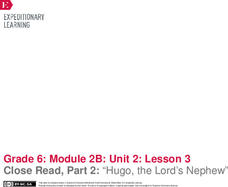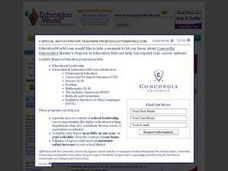Achieve3000
Figurative Language
Similes and metaphors make writing more beautiful and detailed, but can be a little harder to decipher during a first reading. Use a passage from The Man Who Loved Words to show young readers how to think through passages that contain...
MENSA Education & Research Foundation
Magical Musical Tour: Using Lyrics to Teach Literary Elements
Language arts learners don't need a lecture about poetry; they listen to poetry every day on the radio! Apply skills from literary analysis to famous songs and beautiful lyrics with a instructional activity about literary devices. As...
EngageNY
Close Read, Part 2: “Hugo, the Lord’s Nephew”
No, not literally. Scholars read Hugo, the Lord’s Nephew to compare figurative and literal language. Readers learn about simile, metaphor, personification, and idioms with a graphic organizer. Pupils then answer text-dependent questions...
Curated OER
"Snapshot" Exercises & Sensory Detail Word Bank
Read a sample of creative descriptive writing to your science class. Discuss how writing can be used to record and communicate observations that scientists make. Reading selections and thought-provoking questions are suggested. Also...
Novelinks
The True Confessions of Charlotte Doyle: Magic Square Vocabulary
After reading chapter one of The True Confessions of Charlotte Doyle by Avi, take part in a magic square vocabulary activity in which scholars match the term with its definition and insert its corresponding number in to the magic square...
EngageNY
Close Reading: Paragraphs 1–5 of “Water Is Life”
Be more specific. Scholars take a look at domain-specific vocabulary by discussing an anchor chart. They then look at vocabulary words recorded from paragraphs one through five in Water of Life. After analyzing the vocabulary used in the...
Curated OER
Playing Vocabulary Basketball
Learners view a slide show featuring famous athletes and educational institutions that have played a part in the history of basketball. They participate in a game in which a basketball is tossed from person to person as facts and...
Curated OER
Analyzing Literary Devices
Eighth graders identify figurative language and poetry in this literary analysis lesson. Using Through the Looking Glass by Lewis Carroll and a YouTube video for "The Walrus and the Carpenter," young readers complete a literary device...
Curated OER
Can You Figure Language?
Eighth graders study similes and metaphors and how to explain and create them. After a lecture/demo, 8th graders access websites and worksheets imbedded in this plan to create their own writing.
Pearson
Catching the Sun: Tales from Asia
Explore the folklore of Asia and the South Pacific with this language arts lesson series. Complementing a reading of Catching the Sun: Tales from Asia by Jan M. Mike, this resource supports learners with understanding cause and effect...
EngageNY
Poetic Tools in Narrative of the Life of Frederick Douglass
Scholars listen to a reading and answer probing questions about If We Must Die by Claude McKay. Readers annotate their personal copies of the poem as they discuss its figurative language, vocabulary, and meaning. They then transfer their...
Curated OER
Understanding and Using Suffixes to Expand Vocabulary
After a review of what suffixes are and how they are used, middle schoolers utilize a worksheet that is embedded in the plan to work in pairs to strengthen their understanding and skills in using these very important parts of our...
National Endowment for the Humanities
Language Analysis Based on Stave 1
Class members meet the original scrooge, the Dickens character whose name has become synonymous with a cold-hearted, tight-fisted, miser. Using the provided worksheet, readers closely examine context clues to determine the meanings of...
Curated OER
Introducing New Vocabulary Words
Using context clues, synonyms, antonyms, dictionaries, and original sentences, middle schoolers work through a new list of vocabulary words. A SMART board file guides them through the process of learning and reinforcing the words. After...
EngageNY
Launching the Performance Task
This word or that, this picture or that. Individuals dive into the lives of The Little Rock Nine and the connotation used in the book A Mighty Long Way as they begin the performance task. The task scenario establishes literature lovers...
EngageNY
Inferring About Character: Atticus (Chapter 5)
As part of their study of Harper Lee's To Kill a Mockingbird, class members participate in a silent discussion of the novel using a Chalk Talk chart. They then respond to the teacher's questions by writing their thoughts on the chart....
EngageNY
Analyzing Poems from Inside Out and Back Again to Develop Criteria for an Effective Poem
Scholars analyze a model poem to help guide their poetry writing. They use Think-Pair-Share to discuss word choice and meaning in "Papaya Tree" and "Wet and Crying." To finish, they use their discussions to collect evidence on what makes...
Student Achievement Partners
Eleven
Turning 11 comes with a range of emotions. Explore those emotions by reading the short story "Eleven" by Sandra Cisneros. Readers analyze the main character's reactions to the events of her day. Then, they write an essay describing what...
Poetry4kids
Onomatopoeia Poetry Lesson Plan
Two exercises boost scholars' knowledge of a onomatopoeia with excerpts from famous poems. In exercise one, participants circle onomatopoeia words. Exercise two challenges writers to choose three words to use in an original poem.
Poetry4kids
Personification Poetry Lesson Plan
Scholars take part in two exercises to boost their knowledge of personification. After reading a detailed description and excerpts from famous poems, writers list action verbs and objects then combine words to create a humorous...
EngageNY
Analyzing Word Choice: Understanding Working Conditions in the Mills
Ravenous or hungry, happy or ecstatic—why does word choice matter? Scholars continue to analyze working conditions in the mill and how the conditions affect the protagonist of Katherine Paterson's novel, Lyddie. They engage in a close...
Achieve3000
Context Clues and Idioms
Kids practice using five types of context clues (definition, synonym, antonym, example, and general) to decode idiomatic language.
Curated OER
Mystery Word Wall Game
Practice using words found on the classroom word wall, in vocabulary lists, or on spelling lists with your class. Young readers use clues to find the mystery word in the room. They can tally the points earned from identifying words...
Scholastic
Frindle Lesson Plan
"Who says a pen has to be called a pen? Why not call it a frindle?" Inspired by this quote from the award-winning novel written by Andrew Celements, this lesson allows children to invent their own terms for common classroom objects,...

























